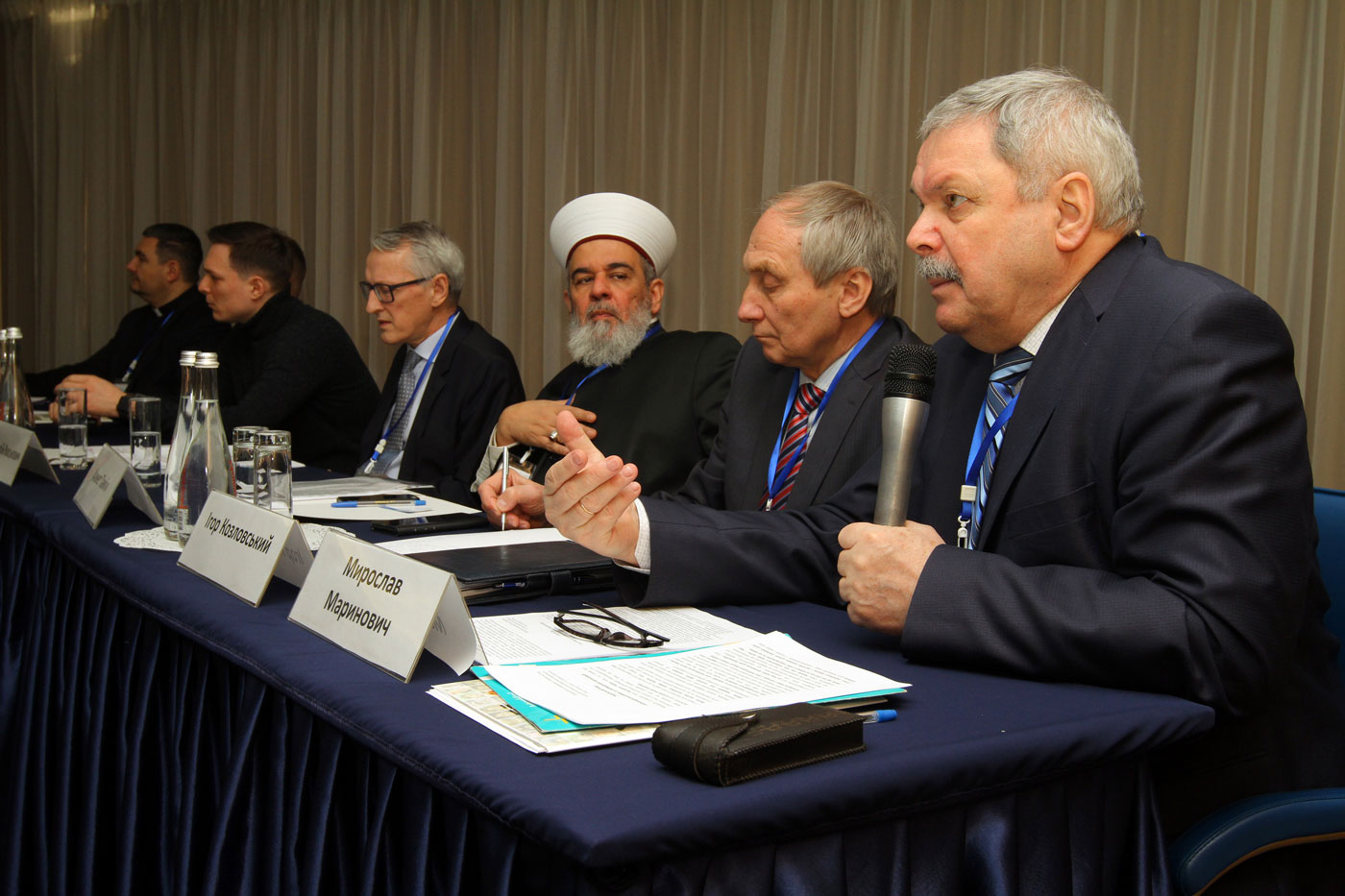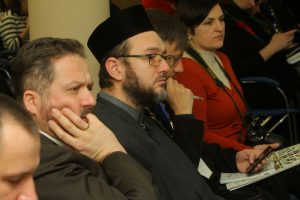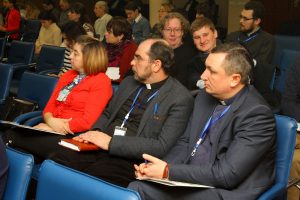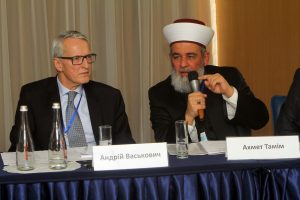
On February 5-6, 2018, the participation of churches and religious organizations in reconciliation and peacebuilding among Ukrainian society was discussed during the conference “Ukrainian peace: joint action of religious and non-governmental organisations”, organized by Caritas Ukraine under “Uniting people for peace” project.
 A panel discussion was joined by Archpriest Ihor Shaban, the Head of UGCC Commission on Promoting Unity among Christians, Mykhailo Basarab, a political scientist, Serhiy Vysotskyi, a people’s deputy of Ukraine, a member of the Verkhovna Rada delegation to the Parliamentary Assembly of the Organization for Security and Co-operation in Europe, Andriy Vaskovych, the President of Caritas Ukraine, Sheikh Akhmed Tamim, Mufti of Ukraine, Ihor Kozlovskyi, a religious scholar, Myroslav Marynovych, a human rights activist, a Vice Rector of the Ukrainian Catholic University.
A panel discussion was joined by Archpriest Ihor Shaban, the Head of UGCC Commission on Promoting Unity among Christians, Mykhailo Basarab, a political scientist, Serhiy Vysotskyi, a people’s deputy of Ukraine, a member of the Verkhovna Rada delegation to the Parliamentary Assembly of the Organization for Security and Co-operation in Europe, Andriy Vaskovych, the President of Caritas Ukraine, Sheikh Akhmed Tamim, Mufti of Ukraine, Ihor Kozlovskyi, a religious scholar, Myroslav Marynovych, a human rights activist, a Vice Rector of the Ukrainian Catholic University.
During the work group, practical steps were discussed on the following topics: the importance of recognizing the truth and elimination of stereotypes, the role of a dialogue and forgiveness, promotion of justice, common action for the future.
According to Hanna Homeniuk, a manager of Caritas Ukraine peacebuilding project, the commission was aimed at unifying efforts of regional branches of religious and non-governmental organisations to promote a peacebuilding initiative. ‘More than 70 participants from 13 towns, starting from Mukachevo to Mariupol, took part in the discussion of the role of churches and religious organizations in promoting peace and cooperation between religious and non-governmental organizations. A strategy developed by the Commission on Social Issues of the All-Ukrainian Council of Churches and Religious Organizations served the basis for the work during the discussion, whose participants proposed to start with an interconfessional dialogue in communities and thought over public events to be carried out to reconcile different groups’, Hanna Homeniuk said.
 ‘Peace can be started with a simple search for common ground and joint projects where representatives of different religious and non-governmental organizations would be able to do something together. The religious factor can be used not only for constructive purposes and peacekeeping objectives, but for reinforcing confrontation and division as well. Understanding of common abilities and resources, to be contributed to the development of the constructive influence from the religious community, opens new horizons for the whole country where unity becomes the foundation’, the Head of Social Affairs of the Patriarchal Curia of the UGCC, Vice president of Caritas Ukraine, Father Andriy Nahirniak said.
‘Peace can be started with a simple search for common ground and joint projects where representatives of different religious and non-governmental organizations would be able to do something together. The religious factor can be used not only for constructive purposes and peacekeeping objectives, but for reinforcing confrontation and division as well. Understanding of common abilities and resources, to be contributed to the development of the constructive influence from the religious community, opens new horizons for the whole country where unity becomes the foundation’, the Head of Social Affairs of the Patriarchal Curia of the UGCC, Vice president of Caritas Ukraine, Father Andriy Nahirniak said.
‘The conference became a symbiosis of ideas and thoughts of representatives of different confessions and religions, but despite different religious views, we were united with a single thing: we all need peace in Ukraine. And this peace starts with every single person, every heart, thought or action. We all felt the price of the war and now have to do our best in each direction to bring the long-awaited peace’, Coordinator of Caritas Kharkiv “Uniting people for peace” project, Maryna Krasnova shared.
 Moreover, “Ukraine is our common home” strategy was presented during the conference, which was approved by the decision of the Commission for Social Service of the All-Ukrainian Council of Churches and Religious Organizations on December 20, 2017. Its main focus is a call for cooperation between religious organisations and communities, as well as common actions with non-governmental bodies. The urgency of this Strategy development is a need for response from churches and religious organizations to a current social and political situation in Ukraine, caused by ongoing transformation of Ukrainian society to democracy and military conflict in the east. Religious community can suggest its own vision for overcoming current social problems instead of passive resistance against attempts to use a high level of social trust to religious institutions in somebody’s mercenary interests. With that, churches and religious organizations will not be deemed as objects of the external influence, but as subjects of peacebuilding initiatives in Ukraine, showing their peacemaking potential and making impossible usage of religion as a tool to fuel conflicts. Moreover, this Strategy can become a basis for the practical implementation of an individual events and interconfessional projects by religious organizations, including attraction of grant funding.
Moreover, “Ukraine is our common home” strategy was presented during the conference, which was approved by the decision of the Commission for Social Service of the All-Ukrainian Council of Churches and Religious Organizations on December 20, 2017. Its main focus is a call for cooperation between religious organisations and communities, as well as common actions with non-governmental bodies. The urgency of this Strategy development is a need for response from churches and religious organizations to a current social and political situation in Ukraine, caused by ongoing transformation of Ukrainian society to democracy and military conflict in the east. Religious community can suggest its own vision for overcoming current social problems instead of passive resistance against attempts to use a high level of social trust to religious institutions in somebody’s mercenary interests. With that, churches and religious organizations will not be deemed as objects of the external influence, but as subjects of peacebuilding initiatives in Ukraine, showing their peacemaking potential and making impossible usage of religion as a tool to fuel conflicts. Moreover, this Strategy can become a basis for the practical implementation of an individual events and interconfessional projects by religious organizations, including attraction of grant funding.
Tags:

